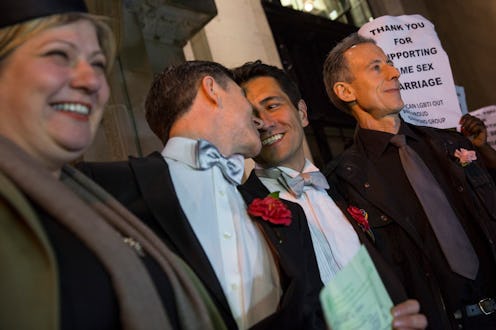News
And The Most Pro-Gay Country Is...
Much has been written about the sea change in opinion on gay marriage in the U.S., with 59 percent of Americans supporting marriage equality in a recent poll. While that’s undoubtedly an huge milestone, America still lags behind other Western nations when it comes to its views on being gay. According to a recent poll, more than one in three Americans think being gay is morally unacceptable, making the U.S. only the 12th most liberal country with regard to views on homosexuality. The most liberal country on that same question? Spain.
The Pew Research survey found that 37 percent of Americans think homosexuality is morally wrong, compared with 19 percent of Italians, 15 percent of Canadians, 8 percent of Germans and only 6 percent of Spaniards. Other countries more accepting of being gay than the U.S. include Argentina, Chile, Australia, Japan, and the Czech Republic.
So, the U.S. still has a ways to go. That said, in 22 out of the 40 countries surveyed, a majority of the population said that homosexuality is morally wrong, so at least America is in the right half of that list. The most homophobic country on the list was Ghana, where a staggering 98 percent of those surveyed said that being gay was morally unacceptable. That was closely followed by Egypt and Jordan (95 percent each) and the Palestinian territories (94 percent). In Uganda, where government-sponsored persecution of LGBT people has made international headlines, 93 percent of people disapproved of homosexuality.
Surveys like these get to the heart of public opinion in ways that polls on specific policies don’t, because a person’s practical assessment of a policy doesn’t always line up with their moral views on that same issue. It’s possible, for example, to think that abortion is morally wrong but nevertheless support it as a right due to the greater harm caused by back-ally abortions. If nothing else, polls like this illuminate complex political issues by helping to separate opinions on specific policies from the moral values that undergird them.
